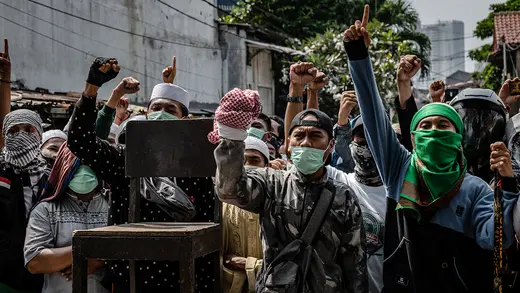In Brief
Indonesia’s Election Exposes Growing Religious Divide
The election results show a hardening of voting patterns along religious, ethnic, and geographic lines, a troubling development for a multiracial and religiously diverse Indonesia.
Incumbent President Joko Widodo, commonly known as Jokowi, won April’s election by a solid eleven-point margin, according to official results released this week. Yet that has not stopped his chief opponent, Prabowo Subianto, a former army general implicated in past human rights abuses, from calling his supporters to the streets. Their initial protests have spurred deadly violence.
Prabowo’s Vow to Fight
The election itself was an impressive success. About 154 million Indonesians, or 79 percent of eligible voters, went to the polls, making it the largest democratic election ever held in one day.
More on:
But Prabowo ran a divisive campaign, using religion as a weapon against Jokowi, a moderate accused of being insufficiently Muslim, and mobilizing radical right-wing Indonesian Islamists to do so. He also laid the groundwork for charges of “systematic fraud” in the weeks before the election, as polls showed him substantially behind Jokowi. When the results were released, he quickly rejected them.
In the ensuing protests in Jakarta, at least six people were killed and dozens more injured. Prabowo has threatened to mobilize a million people to rally in the streets while he prepares to challenge the election results in court, which he must do within three days.
While Prabowo’s fraud claims are dubious, the threat of violence by religious hard-liners in a country with a history of ethnic and religious violence is real. Indonesian police and counterterrorism units have already arrested Prabowo supporters who either called for violence, including waging “jihad,” or were caught with weapons and bombs.
If past is precedent, there will be more efforts to foment unrest, but security forces can be expected to move aggressively against agitators. Prabowo’s court challenge will almost certainly fail, and Jokowi will be inaugurated for a second term as scheduled in October.
Growing Religious Divide
Jokowi, whose campaign platform focused on enacting economic reform, attracting investment, and combating corruption, won convincingly. He not only took the majority of votes nationwide, but also won twenty-one of Indonesia’s thirty-four provinces. But analysis of the geographic and demographic breakdown of votes shows a sectarian divide: Jokowi won by overwhelming numbers in all non-Muslim-majority provinces and suffered heavy losses in many of the most staunchly Muslim regions.
More on:
This hardening of voting patterns along religious, ethnic, and geographic lines is troubling for a multiracial and religiously diverse Indonesia. The country is home to the largest number of Muslims in the world, but it is not an Islamic state. On the contrary, the nation’s founders explicitly rejected efforts to declare Islam as the national religion, choosing instead to enshrine a belief in one god and tenets of diversity in the constitution. This inclusive ethos has been an organizing principle for Indonesia since independence in 1945, giving Indonesian Islam a distinctly moderate and tolerant character.

After decades of financing from Wahhabist religious organizations based in Saudi Arabia, however, Indonesian Islam has become more conservative, and groups that espouse radical Islamist ideologies have found space and taken root. The increasing power of Indonesia’s hard-line Islamist groups manifested in rising incidents of intolerance over the past decade, including attacks on Christian churches.
The degree of these groups’ power was laid bare during the 2017 election for Jakarta governor, when a popular ethnic Chinese and Christian politician, Basuki Tjahaja Purnama, not only lost his election bid but went to prison for blasphemy after Muslim groups mounted massive street protests against him.
These same constituencies have rallied around Prabowo—his own Muslim credentials suspect though they may be—and this year’s election results suggest Islamist groups are gaining ground in some areas. The long-standing consensus captured in Indonesia’s national motto, “Unity in Diversity,” appears to be fraying.
Jokowi and his inner circle are aware of the magnitude of this challenge. With no future elections for the term-limited president, Jokowi has five years to try to turn the tide.
 Online Store
Online Store

